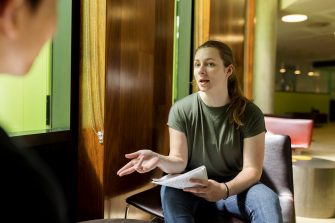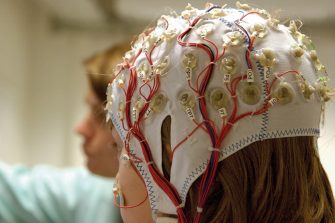What is the discipline of Psychiatry & Mental Health?
The UNSW discipline of Psychiatry & Mental Health leads the delivery of psychiatry education within the medical program, as well as a broad program of research focused on understanding and improving mental health in our community.
Staff come from a wide range of professional backgrounds, including the medical specialty of psychiatry, as well as psychology, nursing and other allied health fields, public health, neuroscience, and the social sciences.
The discipline is widely dispersed, with its primary location at the main Kensington campus. Teaching and research staff are also located across the following locations:
- UNSW Clinical Campuses (Randwick, St Vincent’s Healthcare, St George & Sutherland, South West Sydney and the Rural Campuses).
- Other public and private healthcare sites (Justice Health and Forensic Mental Health Network, St John of God Healthcare Hospitals, Gordon Private Hospital, Ramsay Clinic Northside and the Sydney Clinic).
- Affiliated Medical Research Institutes (Black Dog Institute, Neuroscience Research Australia).
Discipline Report - Psychiatry and Mental Health 2022-23
Our teaching
The discipline teaches psychiatry and mental health topics across all years of the undergraduate medical curriculum, including supporting clinical placements in a wide variety of health settings.
The discipline has also established a Master of Forensic Mental Health postgraduate coursework program.
Our research
Current areas of research in Psychiatry & Mental Health at UNSW include:
- anxiety disorders
- child and adolescent psychiatry
- dementia and old age psychiatry
- depressive and bipolar disorders
- epidemiology
- forensic psychiatry
- intellectual disability and mental health
- migration/asylum seeking and mental health
- neuropsychiatry
- neurostimulation
- neuroimaging
- post-natal disorders
- psychiatric genetics
- psychoneuroimmunology
- schizophrenia
- social psychiatry
- transcultural mental health
- trauma and mental health
UNSW Medicine & Health offer a higher-degree research program in Psychiatry & Mental Health. For more information, please see the UNSW handbook for the Doctor of Philosophy (PhD) program in Psychiatry.
Strengths
The UNSW Discipline of Psychiatry & Mental Health is one of the largest and most successful research departments in the country, and one of the leading university psychiatry, mental health and neuroscience research groups internationally.
Since its establishment, hundreds of research doctorates have been completed under the supervision of academic staff.
The discipline receives considerable research funds from the Australian National Health and Medical Research Council, Australian Research Council and Medical Research Future Fund, and includes the largest group of NHMRC Investigator Grant holders in the field.
Academic staff also receive funding from a very wide range of other peer reviewed competitive funding bodies, industry partners, state and federal government partnerships, and philanthropic sources.
Undergraduate medical students benefit from a broad program of psychiatry education, with clinical placements offered across the full range of subspecialties and in a wide variety of clinical settings.
The Master of Forensic Mental Health program is the leading postgraduate course in forensic mental health nationally.
The discipline hosts the annual Australian Mental Health Prize.
Our research and teaching hospitals
Our rural research and teaching hospitals
- Albury Base Hospital
- Coffs Harbour Base Hospital
- Orange Base Hospital
- Port Macquarie Base Hospital
- Wagga Base Hospital
Student testimonials
- Testimonial 1
- Testimonial 2
- Testimonial 3
Human behaviour can be classified into goal-directed and habitual actions. Individuals with certain psychiatric conditions, such as obsessive-compulsive disorder and tic disorder, often perform actions disconnected from the value or likelihood of receiving outcomes or rewards. Our project aims to develop a novel online experiment to measure such behaviours, coupled with a battery of gold-standard self-reported symptom inventories.
My experience has been superb – being exposed to all aspects of research ranging from data collection and analysis, conducting a systematic review, ethics approval and amendment, collaboration with overseas researchers and software programmers. The incredible support from Prof Mitchell, Dr Perkes and the team was invaluable, considering that ILP was my first formal involvement in research. Working with a diverse group, comprised of members with backgrounds such as Psychology, Computer Science and Science, in addition to Medicine, has been tremendously beneficial in improving my teamwork skills. External opportunities such as the Behavioural Psychology lab meetings were also a part of the holistic experience. All in all, it was a fantastic introduction to academia, which I wish to pursue as a career.
“Having a research year during my undergraduate study was an absolute privilege — my mentors have been acting as compasses, giving directions as I explore the ocean of knowledge, equipping me with skills to sail independently as a budding researcher.”
Alys Lo
Independent Learning Project Student, 2021
Caterina Klasen
Independent Learning Project Student, 2021
My ILP project investigated whether children and adolescents with OCD and Tourette syndrome can flexibly update their behaviour in response to changes in an outcome’s value. This was done through an online vending machine game where the participants could win snacks of their choosing. It was exciting to be part of an online project, as taking research online allows access to a large population, and so this is a very rapidly advancing tool which we will see a lot of in the future. Looking at goal directed learning and the impact of a change in outcome value is relatively new in its application in the younger population. Data for this project will continue to be collected over the next few years and further advance our understanding of these disorders and how we can better manage and treat them. Although mostly conducted online, my supervisor ensured I was able to have some clinical contact with the participants, which was something I personally wanted and really enjoyed during my ILP year. I was also lucky enough to be part of the wider Computational Psychiatry Team, so the cohesive environment made me feel supported across the year. I would recommend undertaking a research project in the field of psychiatry, as there are a wide range of projects to suit different interests and skills.
“I have been extremely thankful for the team at CHeBA for being incredibly supportive and helpful, mentoring me through different aspects of the research process and giving me ample opportunities to practice skills I learnt.”
My research project aimed to determine the validity of Intrinsic Capacity, a novel multisystem framework aimed at characterising and predicting age-related declines in functional ability. I conducted my research under the supervision of Scientia Professor Henry Brodaty, Dr. Suraj Samtani and Dr. Katya Numbers, and I have been incredibly grateful for the support I have been given in navigating the complex and often difficult aspects of the research process. I have been particularly thankful for the mentoring the staff at CHeBA have offered me with regards to statistical and data analysis, which has allowed me to learn and continue to hone cutting-edge techniques used in quantitative analyses. I have also been able to present my findings to other experts in the field, and received the opportunity to prepare a paper for publication
Jared Cheung
Honours Student, 2021






